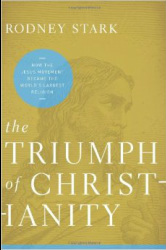Did it ever occur to you that the fall of Rome was a liberating event, not the cause of descent into barbarism, and that therefore the so-called “Dark Ages” are an invention of later historians? That Constantine’s conversion to Christianity and subsequent support of the Church turned out to be a very mixed blessing? That a belief in the God of the Bible encourages and supports science? That the Crusades weren’t the horrible bloodletting that they’re usually made out to be?
I’m still reading this book (having gotten to the chapter on the Protestant Reformation), but it’s so good that I just had to have it as this week’s selection.
I felt sometimes as if Professor Stark had turned my “brain inside out, shook the facts out of it like a vigorous housemaid shaking dust from a carpet, beat it, refreshed it, rubbed up the surface of it, relaid it in a new position and tacked it into place with a firm hand.” (That quotation is from the novel Gaudy Night by Dorothy Sayers, which will make its appearance in this blog at some future date.)
I will say that Stark says a couple of things about the historicity of the New Testament that give me pause. About the statement in I Corinthians that “women should keep silent in the churches” he says, “There are solid grounds for dismissing these lines since they are inconsistent with everything else Paul had to say about women” (125). He disputes the number of conversions recorded at Pentecost: “The claim in Acts 2:41 that in response to a public sermon by Peter, ‘about three thousand souls’ were baptized that day and added to the community of Christians, must be dismissed as hyperbole” (155). I’m not completely sure about his views on what constitutes Christian conversion, as he says in that same passage: “Even had so many come forward (which is extremely unlikely), the primary result would have been three thousand wet Jews and pagans–far more was involved in becoming an authentic Christian than hearing a sermon and getting a quick dunk in the river.” His statement here seems to muddle the moment of regeneration and justification that occurs with true conversion and which indeed takes place in an instant and the process of sanctification that takes place after that. So I can’t agree with everything he says. On the other hand, his approach to telling the story of Christianity is to let the facts speak for themselves and to refuse to buy into reductive or dismissive schools of thought. I can promise that you will be surprised and enlightened and that you will learn a ton about events and people you thought you understood if you invest some time in reading Stark’s work.
Almost as impressive as the content of this book is the style. It is direct, compelling, and no-nonsense. There are even exclamation marks! If you think history is dull and dry, you’ll find out otherwise if you read this. I picked it up because of a recommendation in World magazine and fully intend to read more by this author. Pick it up, read the first few chapters, and see if you can put it down. I’m betting you can’t.
 The Triumph of Christianity: How the Jesus Movement Became the World’s Largest Religion by Rodney Stark, HarperOne, 2011
The Triumph of Christianity: How the Jesus Movement Became the World’s Largest Religion by Rodney Stark, HarperOne, 2011